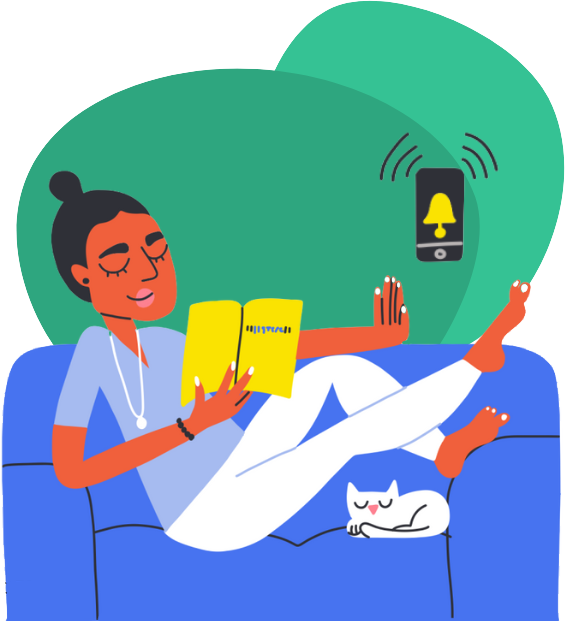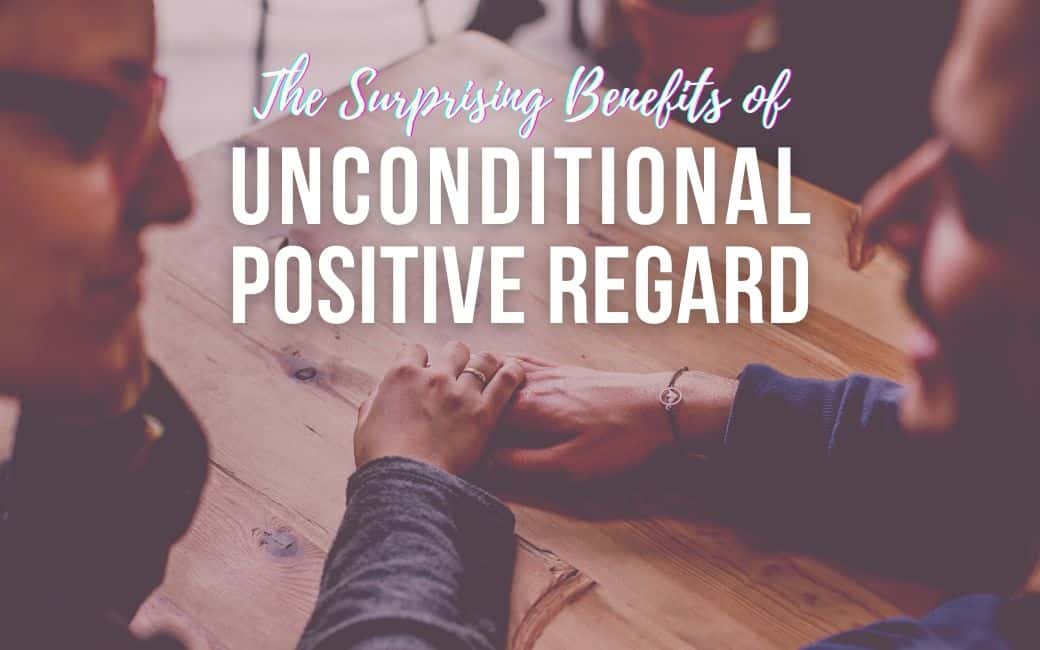In 1967, a catchy tune by The Beatles, “All You Need is Love,” became the anthem for the Summer of Love. The Flower Power culture embraced the song and its message, “love is all you need.” If someone had asked humanistic psychologist Carl Rogers what the song meant, he might have said, “Unconditional Positive Regard!”
Although it didn’t quite roll off the tongue the same way, Rogers introduced the concept nearly a decade before the Beatles song, it has the same basic message: empathy invokes change.
Rogers emphasized the importance of unconditional positive regard in healthy personality development, and his work has implications beyond the lab or therapist’s office. Treating ourselves and others with unconditional positive regard can improve our lives in many ways.
In this article, we will cover:
- What is unconditional positive regard?
- What is an example of unconditional positive regard?
- How does unconditional positive regard facilitate self-actualization?
- How does unconditional positive regard breed self-confidence?
- How does unconditional positive regard bolster motivation?
- How does unconditional positive regard foster authenticity?
What is unconditional positive regard?
Unconditional positive regard is defined by humanistic psychologists to mean expressing empathy, support, and acceptance to someone, regardless of what they say or do.
Unlike other practitioners of his day who offered therapies like behaviorism, which were quick to confront how poor choices hurt us, psychologists like Rogers started by validating their clients’ feelings, withholding judgment, and offering support.
Known as “client-centered therapy,” this treatment emphasizes the healing power of human connection. While Roger’s theory shifted the psychology landscape, it didn’t only benefit therapy seekers.
According to Rogers, problematic behaviors like overeating, drinking too much, and procrastinating aren’t altered with confrontation, judgment, or punishment; they are remedied with compassion, understanding, and acceptance.
In his view, people are wired for self-actualization, or the need to fulfill our potential. However, painful experiences like being bullied, shamed, or judged thwart our growth.
Unconditional positive regard restores hope by showing us we are loved and accepted. From Roger’s lens, when people feel safe, honesty follows. And being honest with ourselves and others is crucial for change.
What is an example of unconditional positive regard?
Unconditional positive regard means offering compassion to people even if they have done something wrong. A therapist practicing unconditional positive regard would respond with compassion to a person in treatment who may have gambled away their savings, lied at work, or mistreated a friend. It is striving to respond with understanding rather than contempt for the individual.
However, unconditional positive regard does not mean unconditional acceptance. We should be careful to not enable others to continue to act in harmful ways out of our desire not to hurt their feelings. Rather, having positive regard means treating people as fallible human beings regardless of what they do, even if we don’t like what they’ve done.
Whereas judgment and shame elicit defensiveness, acceptance fosters safety, which invites honesty and self-exploration. It’s offering the sort of grace we wish others would offer us when we fail.
Let’s say a friend borrowed your new car and brought it back with a dent. Instead of asking, “What on earth happened?” a person-centered therapist would advise you to say, “I see you feel awful. Do you want to tell me what happened?”
In our daily lives, question asking can help us gather information, but in certain tense situations, querying can come across as accusatory and judgmental.
Sometimes it’s hard to withhold our reactions, especially when behavior catches us off guard. For instance, if a co-worker spilled coffee on your laptop, you might be tempted to shout, “Why can’t you be careful?” But in this case, extending unconditional positive regard by saying, “We all make mistakes,” might be a better choice of words.
New parents know it can be stressful to leave their baby with a sitter for the first time. When an anxious mother says, “I’m terrified to leave my baby with a stranger,” the person-centered therapist doesn’t say, “What evidence do you have that your child is unsafe?” Instead, they respond with, “You love your child so much, I can see why you’re worried.” In Roger’s view, providing empathy and acceptance allows people to open up and share more.
Researchers have found unconditional positive regard can benefit us and the people in our lives in many ways.
A 2018 study found that athletes who received unconditional positive regard from their coaches were more motivated to play sports and felt more confident. When adversity cropped up, they rose to the occasion and took on new challenges. Most likely, positive regard sparked their inner enthusiasm and love for the game.
On the contrary, athletes who were criticized were less secure, less motivated, and more likely to burn out. Education researchers also suggest that students who receive unconditional positive regard from their teachers are more motivated to succeed.
The takeaway: unconditional positive regard can spark self-betterment, which can help us lead more meaningful lives. Social scientists also state that using this technique can keep us emotionally fit in several ways.
Free Distraction Tracker
Reclaim control of your attention today.
Your email address is safe. I don't do the spam thing. Unsubscribe anytime. Privacy Policy.

How does unconditional positive regard facilitate self-actualization?
According to Rogers, unconditional positive regard helps us reach our highest potential, also known as “self-actualization.” While psychologist Abraham Maslow believed few people are self-actualized, Rogers saw striving towards growth as part of the human condition.
Relationships that encourage openness, creativity, and honesty foster self-actualization by letting us know it’s okay to think, feel, and behave the way we do. Studies show self-actualization can help us solve problems creatively, embrace change, and cultivate deep and meaningful relationships. Self-actualization also ignites our “inner spark,” which helps us pursue our goals, even when obstacles stand in our way.
How does unconditional positive regard breed self-confidence?
In 2009, Susan Boyle auditioned for Britain’s Got Talent. The 46-year-old hardly looked like your typical pop star with her untamed curly hair and crooked teeth. Before Boyle sang, the audience sneered at her appearance. But when she belted out “I Dreamed a Dream” from Les Misérables, the judges were stunned.
When reporters asked Boyle about the audience’s initial criticism, she replied: “I know what they were thinking, but why should it matter as long as I can sing? It’s not a beauty contest.” In other words, Boyle didn’t accept their criticism.
In the end, Boyle didn’t win the competition, but she signed with Columbia records. At 47, she turned her hobby into a profession. None of this would have happened if rejection had ruined her confidence.
Sharp words and judgment can shrink our confidence, but unconditional positive regard, for ourselves as well as others, can bring it back. After the audition, one of Boyle’s favorite singers, Elaine Paige, called her a role model and praised Boyle for pursuing her dream.
How does unconditional positive regard bolster motivation?
While Rogers considered unconditional positive regard necessary for successful therapy, research suggests it’s beneficial in the workplace as well by increasing motivation.
A 2018 study, published in the British Journal of Management found that employees who received unconditional positive regard from their colleagues felt valued, which enhanced their motivation, job performance, and job satisfaction. These collaborative relationships also cultivated a sense of inclusion, which heightened workplace morale.
When it comes to goal-setting, mindset matters. Let’s say we set out to exercise more, be less distracted, or go to bed on time. At the outset, if we call ourselves “lazy,” or “lacking self-control,” our internal narrative can evoke false beliefs that influence our behaviors by reducing our motivation to change.
When we strive to make changes or meet new goals, research suggests positive self-regard can unleash intrinsic motivation, which is the “desire to do something for its own sake.” Taking on challenges that interest us can make us more motivated and more self-determined.
How does unconditional positive regard foster authenticity?
Social worker and shame researcher, Dr. Brené Brown says authenticity is “the daily practice of letting go of who we think we’re supposed to be and embracing who we are.” Rogers said authentic people are comfortable with vulnerability and approach others with openness and curiosity. In short, authenticity builds intimacy.
But frequently, our authentic self is shut down by shame, judgment, and criticism. Perhaps someone once told us we were “too sensitive,” “not talkative enough,” or “too nerdy.” Or maybe we were teased for not following the crowd in some way. These messages convey that it’s not okay to be who we want to be.
As a result, we’re forced to choose between living out our values and feeling rejected (usually by those we need and love most) or changing our views to fit in. Often, we’d rather ignore some aspect of ourselves than feel left out.
When we make choices that don’t line up with our values, we often look back in regret. For instance, we may forgo giving a speech or applying for a promotion because we’re afraid of embarrassment or not being able to live up to expectations on the job. But turning down opportunities that can help us become who we want to be because we’re scared of social rejection, stymies our growth and taints our self-perception.
Insecurity and self-doubt may hinder motivation, but unconditional positive regard can dismantle shame, which helps us stay true to ourselves, even when others doubt us.
Behavior change is identity change.
If we are to alter the way we act, we need to change the way we see ourselves. Extending ourselves towards unconditional positive regard and self-compassion invites us to live out our values without fear.
It can be easy to associate unconditional positive regard with “feel good” psychotherapy, but as studies show, the practice can bolster self-motivation, confidence, and foster authenticity.
Perhaps we want to run a marathon, write a book proposal, or develop our ability to be indistractable; whatever the aspiration, compassion and acceptance can get us there. It’s all we really need.
Related Articles
- Schedule Maker: a Google Sheet to Plan Your Week
- Habit Tracker Template in Google Sheets
- The Ultimate Core Values List: Your Guide to Personal Growth
- Timeboxing: Why It Works and How to Get Started in 2024
- An Illustrated Guide to the 4 Types of Liars
- Hyperbolic Discounting: Why You Make Terrible Life Choices
- Happiness Hack: This One Ritual Made Me Much Happier

